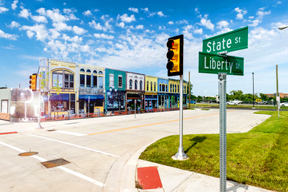MCity, The Fake City That's A Real Proving Ground For Autonomous Vehicles
 MCity, a 32-acre complex that has risen out of a grassy field on the back of the University of Michigan’s North Campus, was designed for one reason: to "create an accelerated learning environment" that will help transform autonomous driving from a concept to reality, said Peter Sweatman, the head of the university’s Transportation Research Institute.
MCity, a 32-acre complex that has risen out of a grassy field on the back of the University of Michigan’s North Campus, was designed for one reason: to "create an accelerated learning environment" that will help transform autonomous driving from a concept to reality, said Peter Sweatman, the head of the university’s Transportation Research Institute.
While a number of automakers, as well as tech giant Google, are already testing autonomous vehicles on public roads, MCity will allow them "to take the unusual things that happen on the road and repeat them as often as we want," helping to ensure that those vehicles will be able to deal with the range of challenges human drivers might face at one point or another.
The $10 million public-private project has drawn a wide range of sponsors including Detroit’s Big Three automakers, Japan’s Toyota, Nissan, and Honda; and even China’s Changan Automobile Group. There are some of the world’s largest automotive suppliers, including Detroit-based Delphi and Japan’s Denso, along with major tech and telecomm firms such as Verizon, Xerox, and Qualcomm.
In recent weeks, crews put the final touches on the miniature city, laying out streets, freeway interchanges, fake buildings, sidewalks, traffic lights, and street lights. But they’ll be on call to rip things up and redesign them as the development process gets underway, explains Jim Sayer, the MCity project’s Development Director.
If anything, he contends, participants will be able to test things they couldn’t on real roads, like whether their automatic braking systems properly detect bicyclists, or pedestrians who walk out onto a busy street from behind a big truck.
And while most of the autonomous vehicle testing so far has been done in warm weather venues like California and Nevada, "We think our weather is an advantage," suggests Sayer, as he watches the official ribbon cutting at the suburban Detroit facility. "We can create all the scenarios you might have to drive through."
That’s a major challenge for the sensors used in today’s autonomous vehicle prototypes. They have trouble distinguishing between snow, ice ,and sand, for example. And vision systems meant to keep a car in its lane can be confused when the white stripes fade. They can even be distracted by skid marks, conceded Tesla Motors CEO Elon Musk, during a news conference.
Tesla and Google have not yet joined the list of MCity participants, but project organizers hope to bring them aboard soon.
 MCity, a 32-acre complex that has risen out of a grassy field on the back of the University of Michigan’s North Campus, was designed for one reason: to "create an accelerated learning environment" that will help transform autonomous driving from a concept to reality, said Peter Sweatman, the head of the university’s Transportation Research Institute.
MCity, a 32-acre complex that has risen out of a grassy field on the back of the University of Michigan’s North Campus, was designed for one reason: to "create an accelerated learning environment" that will help transform autonomous driving from a concept to reality, said Peter Sweatman, the head of the university’s Transportation Research Institute.